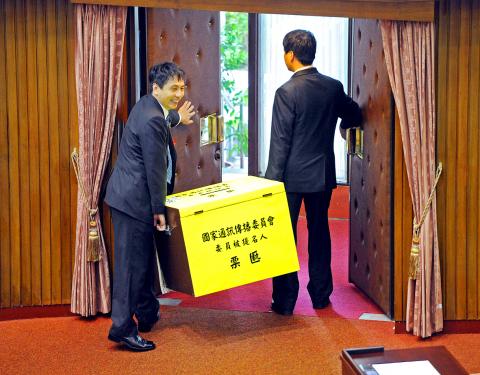The legislature yesterday approved the appointments of all seven Fair Trade Commission members and National Communications Commission (NCC) member Chiang Yu-feng (江幽芬), but withheld the review of Wang Yung-ho (汪用和) until the next legislative session next month.
Although the Democratic Progressive Party (DPP) caucus voted against the nominees and the Taiwan Solidarity Union (TSU) caucus abstained from voting, the candidates passed the review with the support of Chinese Nationalist Party (KMT) lawmakers.
FTC Chairman Wu Shiow-ming (吳秀明) and Vice Chairman Sun Lih-chyun (孫立群), along with the other five candidates, all passed the minimum required number of votes — ie, 54, or more than half of the 106 lawmakers presents — and were approved as members of the independent commission.

Photo: CNA
The lawmakers voted 63 to 41 in favor of Chiang’s nomination with two invalid votes, but decided to postpone the review of Wang’s candidacy until the new session.
According to the National Communications Commission Organization Act (通傳會組織法), seven commissioners are to serve a four-year term after being nominated by the premier and approved by the legislature.
Wang and Chiang were nominated by the Executive Yuan last month to fill the vacancies created by the resignation of Chang Shi-chung (張時中) and Chen Yuan-ling (陳元玲).
However, Wang’s review last week was suspended after DPP Legislator Kuan Bi-ling (管碧玲) raised the question of a potential conflict of interest because of her family’s business links to China.
Kuan said Wang’s uncle, Wang Chao-yong (汪潮涌), owns a Beijing-based investment firm called ChinaEquity Group and is also an investor in a firm owned by Wang’s father, Wang Da-hua (汪大華), that invests in value-added telecoms services.
Wang Yung-ho, the wife of former KMT lawmaker Justin Chou (周守訓), subsequently issued a press release accusing Kuan of mud-slinging, rebutting Kuan’s allegations that her father owns a Chinese-invested firm and saying her uncle’s investment in China does not operate in sectors that falls under the NCC’s purview.
She added that Wang Chao-yong is not a blood relation and that she calls him uncle out of respect for his age.
The accusations made by the DPP that she might sell out Taiwanese interests constitute “character assassination,” she said.
“The DPP has blown everything out of proportion. Is every lawmaker who has friends investing in China likely to sell out the national interests?” Wang Yung-ho asked.
Cabinet Deputy Secretary-General Steven Chen (陳士魁) told reporters yesterday that the Executive Yuan continues to support Wang’s nomination and it was unfair to use her uncle’s business in China against her because “it is not illegal according to current regulations.”
Kuan blasted the Executive Yuan at a press conference for refusing to replace Wang with a new nominee and said Wang had lied in her press release.
Wang Chao-yung’s ChinaEquity Group has invested in telecommunications services and new media ventures, and the company owned by Wang’s father is registered with the Ministry of Economic Affairs as a “Chinese-invested company,” with 60 percent owned by Wang Chao-yung, Kuan said.
Premier Sean Chen needs to explain why the Executive Yuan insists on nominating Wang Yung-ho, Kuan said.
As for Wang Yung-ho’s contention that Internet service providers (ISP) — one of Wang Chao-yung’s business investment targets — do not fall under the NCC’s purview, DPP Legislator Yeh Yi-jin (葉宜津) said that ISPs and Internet content providers are both regulated by the NCC.
“Wang’s [Yung-ho] argument shows that she is not qualified to serve on the NCC board because she does not even know what the commission does,” Yeh said.

Alain Robert, known as the "French Spider-Man," praised Alex Honnold as exceptionally well-prepared after the US climber completed a free solo ascent of Taipei 101 yesterday. Robert said Honnold's ascent of the 508m-tall skyscraper in just more than one-and-a-half hours without using safety ropes or equipment was a remarkable achievement. "This is my life," he said in an interview conducted in French, adding that he liked the feeling of being "on the edge of danger." The 63-year-old Frenchman climbed Taipei 101 using ropes in December 2004, taking about four hours to reach the top. On a one-to-10 scale of difficulty, Robert said Taipei 101

Nipah virus infection is to be officially listed as a category 5 notifiable infectious disease in Taiwan in March, while clinical treatment guidelines are being formulated, the Centers for Disease Control (CDC) said yesterday. With Nipah infections being reported in other countries and considering its relatively high fatality rate, the centers on Jan. 16 announced that it would be listed as a notifiable infectious disease to bolster the nation’s systematic early warning system and increase public awareness, the CDC said. Bangladesh reported four fatal cases last year in separate districts, with three linked to raw date palm sap consumption, CDC Epidemic Intelligence

Two Taiwanese prosecutors were questioned by Chinese security personnel at their hotel during a trip to China’s Henan Province this month, the Mainland Affairs Council (MAC) said yesterday. The officers had personal information on the prosecutors, including “when they were assigned to their posts, their work locations and job titles,” MAC Deputy Minister and spokesman Liang Wen-chieh (梁文傑) said. On top of asking about their agencies and positions, the officers also questioned the prosecutors about the Cross-Strait Joint Crime-Fighting and Judicial Mutual Assistance Agreement, a pact that serves as the framework for Taiwan-China cooperation on combating crime and providing judicial assistance, Liang

US climber Alex Honnold left Taiwan this morning a day after completing a free-solo ascent of Taipei 101, a feat that drew cheers from onlookers and gained widespread international attention. Honnold yesterday scaled the 101-story skyscraper without a rope or safety harness. The climb — the highest urban free-solo ascent ever attempted — took just more than 90 minutes and was streamed live on Netflix. It was covered by major international news outlets including CNN, the New York Times, the Guardian and the Wall Street Journal. As Honnold prepared to leave Taiwan today, he attracted a crowd when he and his wife, Sanni,